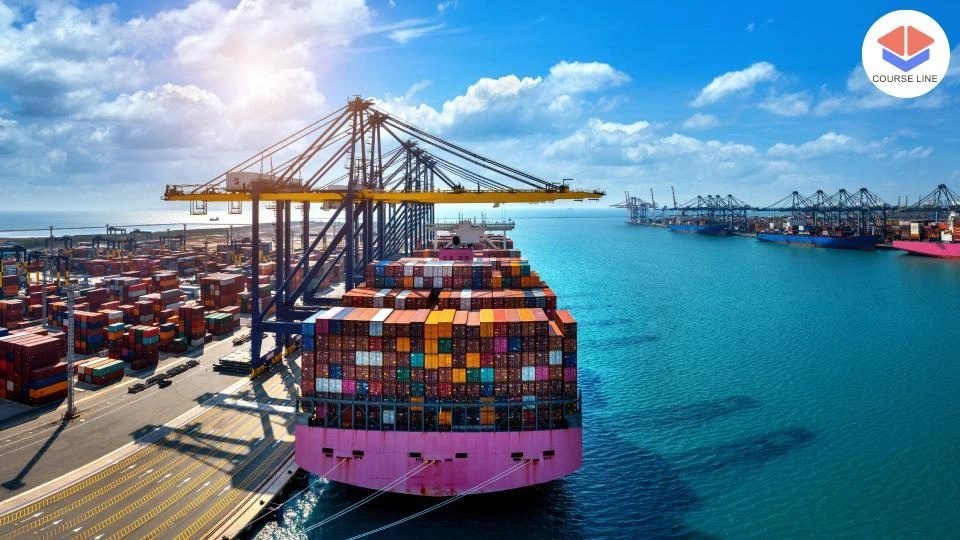Course Features
Price
Study Method
Online | Self-paced
Course Format
Reading Material - PDF, article
Duration
5 hours, 35 minutes
Qualification
No formal qualification
Certificate
At completion
Additional info
Coming soon
- Share
Overview
The Logistics Level 3 Advanced Diploma is a comprehensive training programme aimed at individuals seeking to develop a solid foundation in logistics and supply chain management. This course explores the vital role logistics plays in ensuring the smooth movement of goods and materials, providing learners with practical tools and strategic insights to manage complex logistics operations across industries.
Beginning with an introduction to logistics and its significance within modern business operations, the course delves into how efficient logistics strategies can improve service delivery, reduce operational costs, and enhance customer satisfaction. Learners explore the evolution of logistics, current industry trends, and the impact of globalization on the flow of goods across borders.
Strategic planning forms a core component of the programme, with modules focusing on logistics forecasting, inventory management, and operational optimisation. These lessons help learners develop the ability to align logistics strategies with overall business goals. Transport and distribution management are also covered in depth, including an overview of transportation modes, freight forwarding practices, and how to design effective distribution networks that balance cost, speed, and reliability.
In the warehousing and storage module, students explore the design and functionality of warehouses, inventory control methods, and technology-driven systems that streamline operations. Procurement and supplier management is another key area of study, where learners gain insight into sourcing strategies, supplier evaluation techniques, and the importance of maintaining strong supplier relationships for long-term success.
Risk management and compliance are crucial in logistics, especially in the context of international trade. The course addresses how to conduct risk assessments, navigate regulatory requirements, and implement contingency plans to ensure business continuity during disruptions. Learners also study the importance of integrating IT systems, including Warehouse Management Systems (WMS) and Transportation Management Systems (TMS), to improve visibility, efficiency, and decision-making.
With growing emphasis on sustainability, the course includes a dedicated module on green logistics, highlighting how companies can reduce their environmental impact through sustainable supply chain practices and eco-friendly initiatives. Learners also explore the intricacies of international logistics, covering import-export procedures, trade regulations, and documentation requirements such as Incoterms.
By the end of this diploma, students will be well-versed in the fundamentals and emerging challenges of logistics, ready to contribute to operational excellence and strategic growth in various sectors including manufacturing, retail, e-commerce, and global trade.
There are no formal prerequisites for this course, but a basic understanding of business operations or supply chain concepts is helpful. Learners should have access to a computer and internet connection to complete digital materials and assignments.
Who is this course for?
The Logistics Level 3 Advanced Diploma is a comprehensive training programme aimed at individuals seeking to develop a solid foundation in logistics and supply chain management. This course explores the vital role logistics plays in ensuring the smooth movement of goods and materials, providing learners with practical tools and strategic insights to manage complex logistics operations across industries.
Beginning with an introduction to logistics and its significance within modern business operations, the course delves into how efficient logistics strategies can improve service delivery, reduce operational costs, and enhance customer satisfaction. Learners explore the evolution of logistics, current industry trends, and the impact of globalization on the flow of goods across borders.
Strategic planning forms a core component of the programme, with modules focusing on logistics forecasting, inventory management, and operational optimisation. These lessons help learners develop the ability to align logistics strategies with overall business goals. Transport and distribution management are also covered in depth, including an overview of transportation modes, freight forwarding practices, and how to design effective distribution networks that balance cost, speed, and reliability.
In the warehousing and storage module, students explore the design and functionality of warehouses, inventory control methods, and technology-driven systems that streamline operations. Procurement and supplier management is another key area of study, where learners gain insight into sourcing strategies, supplier evaluation techniques, and the importance of maintaining strong supplier relationships for long-term success.
Risk management and compliance are crucial in logistics, especially in the context of international trade. The course addresses how to conduct risk assessments, navigate regulatory requirements, and implement contingency plans to ensure business continuity during disruptions. Learners also study the importance of integrating IT systems, including Warehouse Management Systems (WMS) and Transportation Management Systems (TMS), to improve visibility, efficiency, and decision-making.
With growing emphasis on sustainability, the course includes a dedicated module on green logistics, highlighting how companies can reduce their environmental impact through sustainable supply chain practices and eco-friendly initiatives. Learners also explore the intricacies of international logistics, covering import-export procedures, trade regulations, and documentation requirements such as Incoterms.
By the end of this diploma, students will be well-versed in the fundamentals and emerging challenges of logistics, ready to contribute to operational excellence and strategic growth in various sectors including manufacturing, retail, e-commerce, and global trade.
There are no formal prerequisites for this course, but a basic understanding of business operations or supply chain concepts is helpful. Learners should have access to a computer and internet connection to complete digital materials and assignments.
Requirements
The Logistics Level 3 Advanced Diploma is a comprehensive training programme aimed at individuals seeking to develop a solid foundation in logistics and supply chain management. This course explores the vital role logistics plays in ensuring the smooth movement of goods and materials, providing learners with practical tools and strategic insights to manage complex logistics operations across industries.
Beginning with an introduction to logistics and its significance within modern business operations, the course delves into how efficient logistics strategies can improve service delivery, reduce operational costs, and enhance customer satisfaction. Learners explore the evolution of logistics, current industry trends, and the impact of globalization on the flow of goods across borders.
Strategic planning forms a core component of the programme, with modules focusing on logistics forecasting, inventory management, and operational optimisation. These lessons help learners develop the ability to align logistics strategies with overall business goals. Transport and distribution management are also covered in depth, including an overview of transportation modes, freight forwarding practices, and how to design effective distribution networks that balance cost, speed, and reliability.
In the warehousing and storage module, students explore the design and functionality of warehouses, inventory control methods, and technology-driven systems that streamline operations. Procurement and supplier management is another key area of study, where learners gain insight into sourcing strategies, supplier evaluation techniques, and the importance of maintaining strong supplier relationships for long-term success.
Risk management and compliance are crucial in logistics, especially in the context of international trade. The course addresses how to conduct risk assessments, navigate regulatory requirements, and implement contingency plans to ensure business continuity during disruptions. Learners also study the importance of integrating IT systems, including Warehouse Management Systems (WMS) and Transportation Management Systems (TMS), to improve visibility, efficiency, and decision-making.
With growing emphasis on sustainability, the course includes a dedicated module on green logistics, highlighting how companies can reduce their environmental impact through sustainable supply chain practices and eco-friendly initiatives. Learners also explore the intricacies of international logistics, covering import-export procedures, trade regulations, and documentation requirements such as Incoterms.
By the end of this diploma, students will be well-versed in the fundamentals and emerging challenges of logistics, ready to contribute to operational excellence and strategic growth in various sectors including manufacturing, retail, e-commerce, and global trade.
There are no formal prerequisites for this course, but a basic understanding of business operations or supply chain concepts is helpful. Learners should have access to a computer and internet connection to complete digital materials and assignments.
Career path
The Logistics Level 3 Advanced Diploma is a comprehensive training programme aimed at individuals seeking to develop a solid foundation in logistics and supply chain management. This course explores the vital role logistics plays in ensuring the smooth movement of goods and materials, providing learners with practical tools and strategic insights to manage complex logistics operations across industries.
Beginning with an introduction to logistics and its significance within modern business operations, the course delves into how efficient logistics strategies can improve service delivery, reduce operational costs, and enhance customer satisfaction. Learners explore the evolution of logistics, current industry trends, and the impact of globalization on the flow of goods across borders.
Strategic planning forms a core component of the programme, with modules focusing on logistics forecasting, inventory management, and operational optimisation. These lessons help learners develop the ability to align logistics strategies with overall business goals. Transport and distribution management are also covered in depth, including an overview of transportation modes, freight forwarding practices, and how to design effective distribution networks that balance cost, speed, and reliability.
In the warehousing and storage module, students explore the design and functionality of warehouses, inventory control methods, and technology-driven systems that streamline operations. Procurement and supplier management is another key area of study, where learners gain insight into sourcing strategies, supplier evaluation techniques, and the importance of maintaining strong supplier relationships for long-term success.
Risk management and compliance are crucial in logistics, especially in the context of international trade. The course addresses how to conduct risk assessments, navigate regulatory requirements, and implement contingency plans to ensure business continuity during disruptions. Learners also study the importance of integrating IT systems, including Warehouse Management Systems (WMS) and Transportation Management Systems (TMS), to improve visibility, efficiency, and decision-making.
With growing emphasis on sustainability, the course includes a dedicated module on green logistics, highlighting how companies can reduce their environmental impact through sustainable supply chain practices and eco-friendly initiatives. Learners also explore the intricacies of international logistics, covering import-export procedures, trade regulations, and documentation requirements such as Incoterms.
By the end of this diploma, students will be well-versed in the fundamentals and emerging challenges of logistics, ready to contribute to operational excellence and strategic growth in various sectors including manufacturing, retail, e-commerce, and global trade.
There are no formal prerequisites for this course, but a basic understanding of business operations or supply chain concepts is helpful. Learners should have access to a computer and internet connection to complete digital materials and assignments.
-
- Overview of Logistics and Supply Chain Management 00:10:00
- Importance of Logistics in Business Operations 00:10:00
- Evolution and Trends in Logistics 00:10:00
-
- Strategic Importance of Logistics in Business 00:10:00
- Logistics Planning and Forecasting Techniques 00:10:00
- Inventory Management and Optimization 00:10:00
- Modes of Transportation (Road, Rail, Air, Sea) 00:10:00
- Freight Forwarding and Shipping 00:10:00
- Distribution Network Design and Management 00:10:00
- Procurement Process and Strategies 00:10:00
- Supplier Selection and Evaluation 00:10:00
- Supplier Relationship Management 00:10:00
- Role of Information Technology in Logistics 00:10:00
- Warehouse Management Systems (WMS) 00:10:00
- Transportation Management Systems (TMS) 00:10:00
- Globalization and International Trade 00:10:00
- Import and Export Procedures 00:10:00
- Incoterms and International Logistics Documentation 00:10:00
- Premium Certificate 00:15:00

No Reviews found for this course.
Is this certificate recognized?
Yes, our premium certificate and transcript are widely recognized and accepted by embassies worldwide, particularly by the UK embassy. This adds credibility to your qualification and enhances its value for professional and academic purposes.
I am a beginner. Is this course suitable for me?
Yes, this course is designed for learners of all levels, including beginners. The content is structured to provide step-by-step guidance, ensuring that even those with no prior experience can follow along and gain valuable knowledge.
I am a professional. Is this course suitable for me?
Yes, professionals will also benefit from this course. It covers advanced concepts, practical applications, and industry insights that can help enhance existing skills and knowledge. Whether you are looking to refine your expertise or expand your qualifications, this course provides valuable learning.
Does this course have an expiry date?
No, you have lifetime access to the course. Once enrolled, you can revisit the materials at any time as long as the course remains available. Additionally, we regularly update our content to ensure it stays relevant and up to date.
How do I claim my free certificate?
I trust you’re in good health. Your free certificate can be located in the Achievement section. The option to purchase a CPD certificate is available but entirely optional, and you may choose to skip it. Please be aware that it’s crucial to click the “Complete” button to ensure the certificate is generated, as this process is entirely automated.
Does this course have assessments and assignments?
Yes, the course includes both assessments and assignments. Your final marks will be determined by a combination of 20% from assignments and 80% from assessments. These evaluations are designed to test your understanding and ensure you have grasped the key concepts effectively.
Is this course accredited?
We are a recognized course provider with CPD, UKRLP, and AOHT membership. The logos of these accreditation bodies will be featured on your premium certificate and transcript, ensuring credibility and professional recognition.
Will I receive a certificate upon completion?
Yes, you will receive a free digital certificate automatically once you complete the course. If you would like a premium CPD-accredited certificate, either in digital or physical format, you can upgrade for a small fee.
Course Features
Price
Study Method
Online | Self-paced
Course Format
Reading Material - PDF, article
Duration
5 hours, 35 minutes
Qualification
No formal qualification
Certificate
At completion
Additional info
Coming soon
- Share
Mixology Marketing: Building a Successful Bartending Business
Course Line242¥4,623.00Original price was: ¥4,623.00.¥141.43Current price is: ¥141.43.RQF Level 3 Certificate in IT User Skills (ITQ)
Course Line237¥4,623.00Original price was: ¥4,623.00.¥141.43Current price is: ¥141.43.Art Therapy Level 7 Advanced Diploma
Course Line246¥4,623.00Original price was: ¥4,623.00.¥141.43Current price is: ¥141.43.





